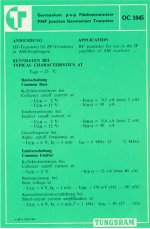Hello,
I've a lot of OC1045 GE transistors, with a very low leakage and low gain ( 20 - 30 hfe ). I've searched what to do with these transistors, and I found an article from AMZ that explains what to do with high leakage transistors.
AMZ Germanium Transistor Buffer
But I think I need to rise R4 with the OC1045.
Zin = ( B + 1 ) x R4
Supposly that I have some AC128 with 100 hfe:
Zin = ( 100 +1 ) x 10000 = 1M
but for the OC1045 with 20 hfe:
Zin = ( 20 +1 ) x 10000 = 210K
It's a bit low impedance for a buffer no?
I'm wrong?
please correct me if it's wrong.
Anybody help me to calculate the Zout?
Thanks.
I've a lot of OC1045 GE transistors, with a very low leakage and low gain ( 20 - 30 hfe ). I've searched what to do with these transistors, and I found an article from AMZ that explains what to do with high leakage transistors.
AMZ Germanium Transistor Buffer
But I think I need to rise R4 with the OC1045.
Zin = ( B + 1 ) x R4
Supposly that I have some AC128 with 100 hfe:
Zin = ( 100 +1 ) x 10000 = 1M
but for the OC1045 with 20 hfe:
Zin = ( 20 +1 ) x 10000 = 210K
It's a bit low impedance for a buffer no?
I'm wrong?
please correct me if it's wrong.
Anybody help me to calculate the Zout?
Thanks.
Last edited:
They are high frequency transistors, gain has been sacrificed in order to optimize high frequency performance (low base-collector capacitance, fast recombination?).Hello,
I've a lot of OC1045 GE transistors, with a very low leakage and low gain ( 20 - 30 hfe ). I've searched what to do with these transistors, and I found an article from AMZ that explains what to do with high leakage transistors.
As for uses, I suspect that sort of transistor was picked in early logic circuitry, the low gain isn't a problem for logic, the high speed is a bonus. Ge devices can work well in single-cell (1.5V) battery-powered circuits due to the low Vbe. For a buffer application use them as Darlington pairs?
They are high frequency transistors, gain has been sacrificed... picked in early logic circuitry..........
Jon's data clearly says "IF amp in AM". The 6MHz cutoff means the working gain at IF is 10 or 15. Excess DC(/audio) gain is not needed, could trouble some radio designs, and anyway high hFE parts can be sold under another number at a higher price.
It's not "the best part" for a guitar buffer. OTOH the demand for Ge AM radios is zilch so the price for "lots" seemed attractive.
There are much smarter ways to make a high-perf buffer from Ge transistors: this exercise has been done (successfully) 50 or 60 years ago.
The AMZ circuit is probably one of the lamest example you could find.
The PCB design hints at that too: needing two layers + PTH for such a primitive circuit is a good indicator of the sophistication level
There are much smarter ways to make a high-perf buffer from Ge transistors: this exercise has been done (successfully) 50 or 60 years ago.
The AMZ circuit is probably one of the lamest example you could find.
The PCB design hints at that too: needing two layers + PTH for such a primitive circuit is a good indicator of the sophistication level
It's not about smart way to make buffer, it's about guitar sound. When I was young, playing and didn't know much about electronics, I've made a buffer with old 741 and 9V battery that sounded great with hambucket pickup on a crappy bulgarian guitar... That sounded better than passive stratocaster, my friend had...
About only rewarding use for a germanium transistor is building al OLD Fuzz or the Dallas Rangemaster treble/gain booster .
Given germanium transistors are leakier than a handknit water hose, I would avoid building Darlingtons around them; high impedance and high Hfe are simply outside their league.
Given germanium transistors are leakier than a handknit water hose, I would avoid building Darlingtons around them; high impedance and high Hfe are simply outside their league.
- Status
- This old topic is closed. If you want to reopen this topic, contact a moderator using the "Report Post" button.
- Home
- Source & Line
- Analog Line Level
- Germanium Buffer Impedance
